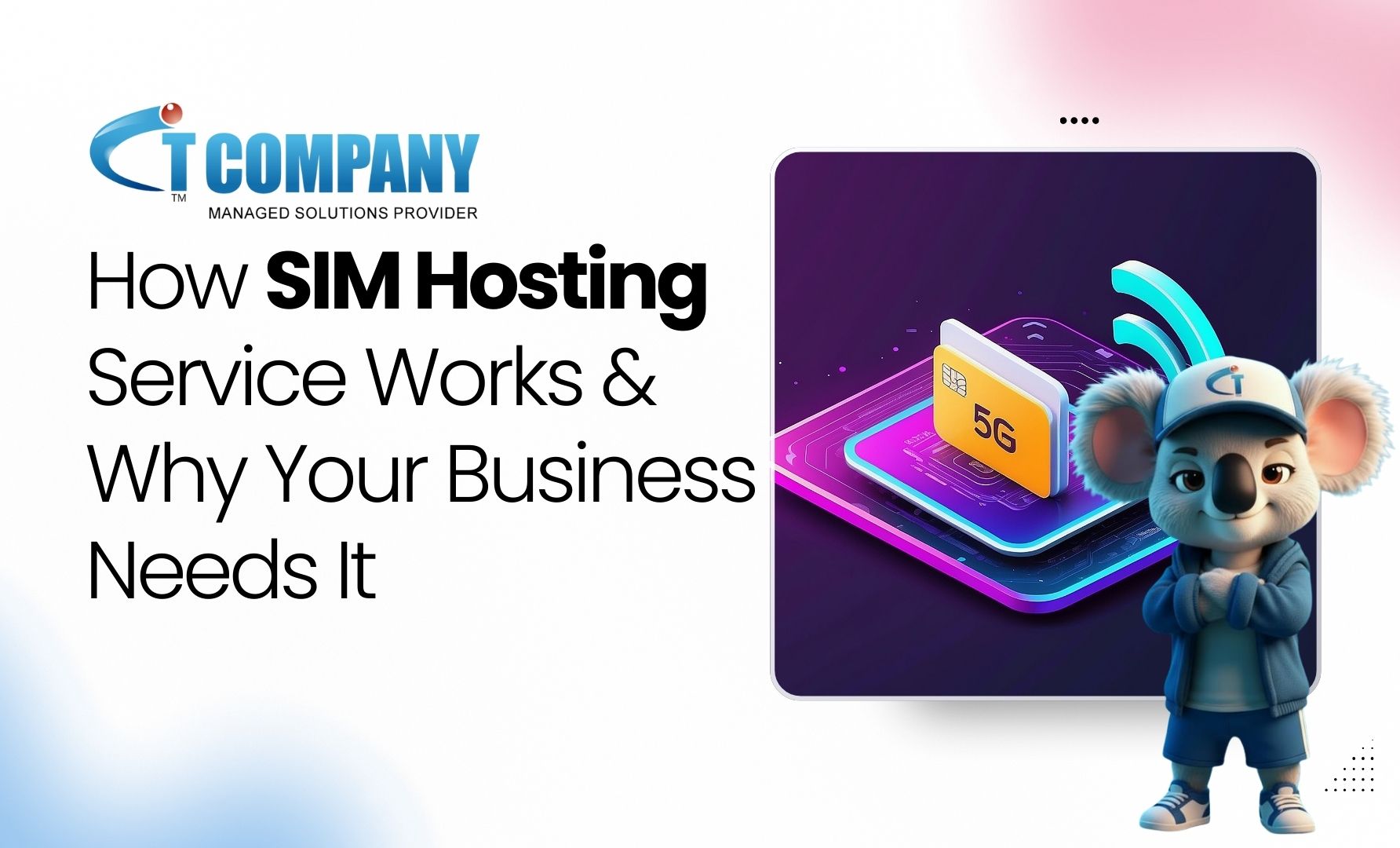What Is SIM Hosting Service?
SIM Hosting Service refers to a solution where a physical SIM card is placed (“hosted”) in a remote server or data centre, rather than being in a mobile phone. This allows businesses to send and receive SMS (and sometimes calls or data) via their own SIM card, using APIs, web dashboards, or URL forwarding.In simpler words: you don’t need the SIM in your hand it stays connected in a hosted modem/server, while you manage it remotely.
How SIM Hosting Works
- SIM Card Submission: You supply your SIM card (or cards) to the SIM hosting provider.
- Installation in Modem / SIM Bank: The SIM is inserted into a modem or a SIM bank in the provider’s data center.
- Connection to Infrastructure: That modem is connected to the provider’s infrastructure so that any SMS (or calls) received by the SIM can be forwarded.
- Message Forwarding: Incoming SMS are forwarded in real time to your system this can be via HTTP API, email, URL callback, or other routes.
- Outgoing Messaging (Optional): Some providers allow you to send SMS from that SIM (or SIM-pool) via their platform.
- Remote Management: You manage SIMs, check status (signal strength, connectivity), and control behavior (e.g. auto-reply) via dashboard or API.
Key Features & Advantages
Here are some of the most important features and benefits of using a SIM Hosting Service:- 24/7 Availability: Since SIM is hosted on always-on infrastructure, you can receive messages anytime.
- No Cost per Incoming SMS: In many SIM hosting setups, you’re not charged for each incoming message the main cost is the hosting infrastructure.
- Auto-Reply & Automation: Setup auto-replies based on keywords or specific rules.
- Reliable Forwarding: Forward messages to a URL (webhook), email, or your database for processing.
- Scalable SIM Pool: You can host multiple SIMs, rotate them, or group them to manage load. Many providers support SIM pooling.
- Global Reach: With the right provider, you can host SIMs from different operators in various countries.
- Integration via API: SIM hosting services often provide REST APIs or other protocols so you can embed messaging logic into your own systems.
- High Uptime: Reliable service with good providers for example, X-Wireless claims 99.5% uptime.
- Security: Enterprise SIM hosters (like Simshareplug) use strong encryption, monitoring, and secure architecture.

Use Cases / Who Needs SIM Hosting
SIM Hosting Service is especially valuable for:- SMS Marketing & Campaigns: Use your SIM number for campaigns, and handle replies via your backend system.
- OTP / Verification Systems: Use SIMs to send or receive one-time passwords for authentication or verification flows.
- IoT / M2M Devices: Devices in the field send SMS or data via SIM, and you’re able to read/interpret it centrally.
- Telecom Testing: For testing SMS flows, delivery, or operator behavior, SIM hosting is much cleaner than physically moving SIMs.
- Remote Teams / Global Business: You can host SIMs in different geographies and manage them remotely.
- Call / SMS Forwarding Services: Use SIM hosting to forward SMS/calls from a number (SIM) to your apps or systems.
Types of SIM Hosting Services
There are different models / types of SIM hosting you might find:- Dedicated SIM Hosting: You host your own SIM card. You provide the SIM, and the provider hosts it in their infrastructure.
- Shared / Keyword-Based SIM Hosting: Multiple users share a SIM, but keywords or sub-keywords allow message routing per user.
- Fully Managed SIM Hosting: The provider handles not just the modem/SIM, but also the SMS gateway, auto-reply setup, database, etc. For example, IT Company Australia offers managed SIM hosting.
- Cloud / Virtual SIM / Mobile Proxy: This is more advanced SIMs are connected to proxy infrastructure for data (internet), voice or SMS, often for automation or account registration.
Technical Details & Integration
To make SIM hosting work effectively, here are some technical aspects:- Modem / SIM Bank: The physical SIM has to be placed in a modem or SIM bank that is always connected.
- API Protocols: Many providers expose APIs for message forwarding (incoming), status checking (signal, balance), and sending messages.
- Network Requirements: The data center needs connectivity, monitoring, and reliability to ensure your SIM remains reachable.
- Message Forwarding: You can set up SMS → HTTP callback (webhook), SMS → Email, SMS → Database.
- Security: Use encryption, secure API keys, and access control for dashboards and SIM status.
Risks, Challenges & Best Practices
While SIM hosting is powerful, there are some risks and challenges:- SIM Card Risk: If you physically hand over your SIM to a provider, there’s a trust risk choose reputable providers.
- Regulatory / Compliance: SMS and SIM services may be regulated; ensure the setup is legal in your country.
- Latency or Downtime: If the hosting infrastructure goes down, your SIM becomes unreachable – pick a host with good SLA.
- SIM Overload: If many messages hit the SIM, you need to make sure the infrastructure can handle the load.
- Security: Ensure data is encrypted, API keys are secure, and the provider uses good security practices.
- SIM Plan: The SIM you host should have a plan that supports your usage (e.g., unlimited SMS or required data) not all SIM plans are equal.
- Carrier Limitations: Certain carriers may block or restrict behavior (e.g., forwarding) check with provider.
- Use trusted SIM hosting providers with good reputation.
- Monitor SIM health, signal strength, and usage.
- Use automation (auto-reply, webhook) to handle incoming SMS efficiently.
- Maintain redundancy host multiple SIMs if critical business process depends on it.
How to Choose a SIM Hosting Provider
When selecting a SIM hosting service, consider:| Criteria | Why It Matters |
|---|---|
| Uptime / SLA | To ensure your SIM is always reachable. |
| API & Dashboard | For seamless integration and control. |
| Security | Encryption, access controls, data privacy. |
| Scalability | Ability to host multiple SIMs or scale up. |
| Global Coverage | If you need SIMs from different geographies. |
| Pricing Model | Fixed monthly hosting cost, or per-SIM, or shared pricing. |
| Support | Technical support (24/7 if needed), setup help. |
| Use Cases | Whether provider supports your use case (SMS only, voice, data). |
Pricing & ROI Considerations
- Monthly Hosting Fee: Depending on provider, SIM hosting can cost a set monthly fee.
- One-time Setup: There may be setup costs (e.g. SIM installation, couriering SIM).
- SIM Cost: You must have or buy the SIM you want to host.
- SMS / API Costs: While some incoming SMS are “free,” outgoing may cost, depending on provider.
- Infrastructure ROI: If you’re using SIMs for critical business flows (OTP, support, marketing), hosting might significantly reduce operating friction or manual cost.
Case Study / Example
Let’s take an example (hypothetical + based on real models):Company: A fintech startup in Australia Use Case: OTP verification & customer feedback SMS Approach:- They buy several SIM cards with local Australia mobile operators.
- They courier them to a SIM hosting provider (or use a local provider like IT Company Australia).
- The provider hosts their SIMs in a SIM-bank or modem.
- Incoming SMS (customer replies) are forwarded via API to their backend.
- For outbound OTP SMS, they either use the same hosted SIM or a separate SMS gateway, depending on cost.
- They set up auto-reply keywords (e.g., “FEEDBACK”) so that when a user texts “FEEDBACK”, the system logs the message, sends an acknowledgement, and stores it.
- No need to physically place SIMs in devices.
- They get real customer replies.
- Automation reduces manual SMS checking.
- Cost is optimized since SIM is continuously active.
Call to Action (CTA)
If you’re interested in exploring SIM hosting services, you should contact a provider (like IT Company) to discuss your SIM-hosting needs, get a quote, and evaluate how it can integrate with your systems.Conclusion
In today’s business landscape, SIM hosting service is an increasingly powerful tool. It bridges the gap between traditional SMS communication and modern, automated, cloud-based workflows. Whether you are running marketing campaigns, handling user verification, managing IoT devices, or performing telecom testing SIM hosting gives you the flexibility, control, and reliability that physical SIMs in phones simply can’t match.If you’re a business looking to scale your SMS operations, or reduce the friction of managing SIMs manually, investing in a reliable SIM hosting provider can yield strong returns. Be sure to assess providers on their uptime, API capabilities, security, and pricing. And if you’re based in Australia (or anywhere), pick a provider that aligns with your regional needs.FAQ’s
What is SIM Hosting Service?
It’s a service to host a physical SIM card on a remote modem / server, allowing message handling over the internet.
Can I use SIM hosting for both incoming and outgoing SMS?
Yes many providers support two-way SMS. (aql.com)
Do I need to send you my SIM card?
For many dedicated hosting providers, yes you have to physically send your SIM so they can host it in their hardware.
Subscribe
Login
0 Comments

